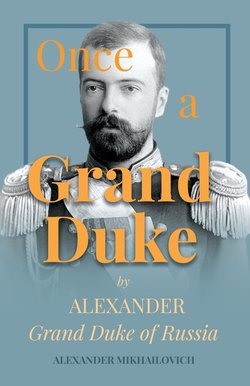Читать книгу Once A Grand Duke by Alexander Grand Duke of Russia - Alexander Mikhailovich - Страница 27
На сайте Литреса книга снята с продажи.
2
ОглавлениеFortunately enough, Alexander III possessed all the qualities of a great administrator. A confirmed believer in the policies dictated by healthy national egotism, a thorough disciplinarian and a thinker of pronounced skepticism, he brought to the throne a complete freedom from all illusions. He had watched the passing show of the imperial court sufficiently long to acquire contempt for his father’s collaborators, while his knowledge of the rulers of contemporary Europe gave birth to his well-motivated distrust of their intentions. He blamed the majority of Russia’s ills on the irresponsible liberalism governing our domestic affairs and on an asinine tendency toward catering to the foreign powers, a tendency which influenced the actions of our diplomats.
Twenty-four hours after the funeral of his father, he announced a long series of swift reforms. Everything and everybody were to be changed: ministers, ambassadors, methods, mentality. He commenced by getting rid of General Loris-Melikoff and all other members of the cabinet. Their successors were found outside the ranks of the courtiers, which created immediate jealousies among the idle chatterers of St. Petersburg.
“The days of the darkest reaction are here,” said the disconsolate leaders of a would-be republic, but the biographies of the new ministers gave the lie to this biased opinion. Prince Khilkoff, entrusted with the administration of railroads and highways, spent his adventurous youth in the United States working as a hired laborer in the mines of Pennsylvania. Professor Vyshnegradsky enjoyed international recognition for the originality of his economic theories; his cleverness restored Russian finances to a flourishing state and contributed largely to the industrialization of our rural empire. General Vannovsky, the famous hero of the Russo-Turkish War, took charge of the army. Admiral Shestakoff, exiled by Alexander II because of his bitter criticism of the organization of our fleet, was recalled from Paris and made Minister of the Navy. Count Tolstoi, the new Minister of the Interior, was the first Russian administrator to realize that the prosperity of the peasant class should be considered the main care of the Imperial Government. Sergei Witte, a former modest employee of the South-Western railways and the future Prime Minister of Russia, likewise owed his meteoric rise to the farsightedness of Alexander III, who nominated him Under-Secretary of State, recognizing the unquestionable genius of this awkward gaunt provincial.
The appointment of Count de Giers, a soft-spoken gentleman known for his lack of initiative, to the post of Minister of Foreign Affairs caused a certain amazement both at home and abroad. The Emperor chuckled. He would have preferred to be his own Minister of Foreign Affairs but as he had to have a “dummy” in the foreign office, he decided to choose a faithful clerk who would be sure to follow the ideas of his master and who would be able to clothe the sometimes abrupt language of the Czar in the niceties of the high-mannered chancelleries. The record of the following thirteen years proved his wisdom. No “brilliant international mind” and no “favorite of all the capitals of Europe” could have outdone timorous De Giers in the religious execution of the Emperor’s orders. For the first time in centuries Russia acquired a clear-cut international policy.
His cabinet formed and a plan of action worked out, Alexander III next turned toward the turbulent problem of the safety of the imperial family. He solved it in the only logical way by moving his residence to the Palace of Gatchino. His pride was hurt: “To think that after having faced the guns of the Turks I must retreat now before those skunks,” he exclaimed in a fury. He realized, however, that Russia could ill afford to lose two Czars within one year. In so far as his work was concerned, he benefited greatly by the distance separating Gatchino from St. Petersburg. It provided him with an alibi for curtailing his innumerable social duties and it kept his relatives from calling on him too frequently. The family reunions bored him. He thought it extremely silly to waste so much valuable time in meaningless conversations with his brothers, uncles and cousins. He did not mind the youngsters—myself and Sergei paying almost daily visits to Nicky and Georgie—but he had no patience for the eternal demands of the grown-ups. During his reign the imperial palace became just what it should be: a place housing the busiest man in Russia.
